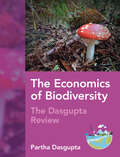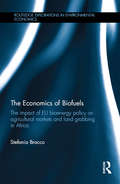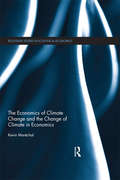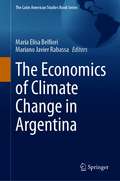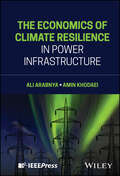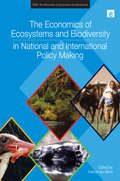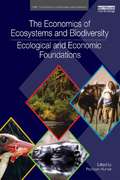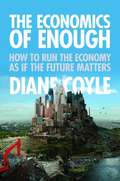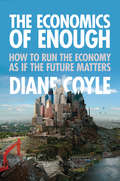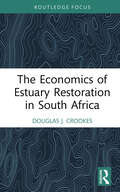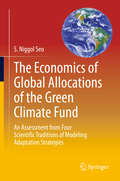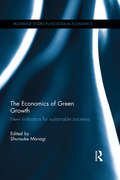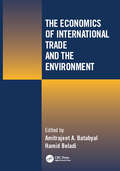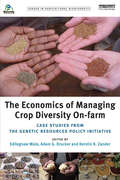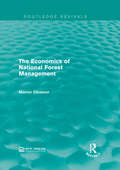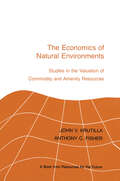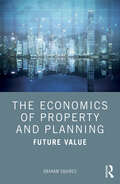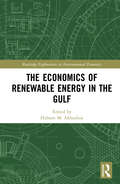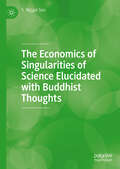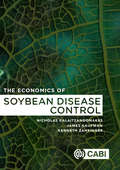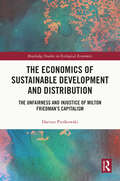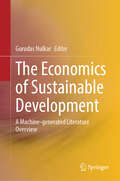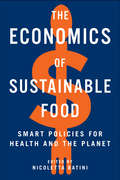- Table View
- List View
The Economics of Biodiversity: The Dasgupta Review
by Partha DasguptaWe are part of Nature, not separate from it. We rely on Nature to provide us with food, water and shelter; regulate our climate and disease; maintain nutrient cycles and oxygen production; and provide us with spiritual fulfilment and opportunities for recreation and recuperation, which can enhance our health and well-being. Nature's constituents such as ecosystems and the biodiversity that are embodied in them are therefore assets. Yet Nature is more than an economic good: many recognise its intrinsic worth and argue that it has moral worth too. This landmark report explains the current state of play in relation to biodiversity loss and outlines a sustainable path to deal with this problem, one that will require us to change how we think, act and measure success. The report was originally commissioned and published by HM Treasury. This title is also available as Open Access on Cambridge Core.
The Economics of Biofuels: The impact of EU bioenergy policy on agricultural markets and land grabbing in Africa (Routledge Explorations in Environmental Economics)
by Stefania BraccoBiofuels are a renewable source of energy used mainly for transportation. They link together food, energy and natural resources sectors, and involve ecological, social and inequality issues. They are an emblematic example of the interactions between economic, environmental, social and political decisions and, as a recent and complex issue, require updated and detailed information to be understood. This book aims to shed light on several economic, social and environmental issues connected to biofuel production and policies. The Economics of Biofuels adopts detailed descriptions, rigorous data analysis and precise econometric methods to estimate the effects of biofuel on different socio-economic factors, avoiding complicated and sometimes ineffective models based on context-specific parameters. In particular, the book focuses on the impact of bioenergy policy on biocommodity production and trade, and on the related phenomenon of land acquisitions to grow biofuel commodities. The book’s main findings are derived by an original and unique dataset collecting information on the investors acquiring land in Africa and on the voluntary standard, certification and labelling schemes adopted by them as Corporate Social Responsibility (CSR) strategy. The analysis links together in an original way public and private initiatives to make biofuel sustainable. Therefore, this book represents an improvement in the understanding of biofuel production and policy’s sustainability. This book is of interest to those who study environmental economics, agricultural economics and sustainable development. It is also suitable for those in the renewable energy sector, with a particular focus on biofuel sustainability.
The Economics of Climate Change
by Nicholas SternThere is now clear scientific evidence that emissions from economic activity, particularly the burning of fossil fuels for energy, are causing changes to the Earth's climate. A sound understanding of the economics of climate change is needed in order to underpin an effective global response to this challenge. The Stern Review is an independent, rigourous and comprehensive analysis of the economic aspects of this crucial issue. It has been conducted by Sir Nicholas Stern, Head of the UK Government Economic Service, and a former Chief Economist of the World Bank. The Economics of Climate Change will be invaluable for all students of the economics and policy implications of climate change, and economists, scientists and policy makers involved in all aspects of climate change.
The Economics of Climate Change and the Change of Climate in Economics
by Kevin MaréchalClimate change is without question the single most important issue the world faces over the next hundred years. The most recent scientific data have led to the conclusion that the globally averaged net effect of human activities since 1750 has been one of warming and that continued greenhouse gas emissions at or above current rates would cause this process to continue to the severe detriment of our environment. This unequivocal link between climate change and human activity requires an urgent, world-wide shift towards a low carbon economy and coordinated policies and measures to manage this transition. The starting point and core idea of this book is the long-held observation that thethreat of climate change calls for a change of climate in economics. Inherent characteristics of the climate problem including complexity, irreversibility and deep uncertainty challenge core economic assumptions and mainstream economic theory appears inappropriately equipped to deal with this crucial issue. Kevin Maréchal shows how themes and approaches from evolutionary and ecological economics can be united to provide a theoretical framework that is better suited to tackle the problem.
The Economics of Climate Change in Argentina (The Latin American Studies Book Series)
by Maria Elisa Belfiori Mariano Javier RabassaIn this volume, the contributors discuss some of the most remarkable global warming effects in Argentina and examine policies that Latin American countries could follow to achieve their individual climate goals. Climate change is one of the most pressing issues today. However, after many years of climate negotiations, the world has failed to introduce a common global policy. Differences in countries' climate agendas have led to unsuccessful efforts. Countries willing to pursue a climate policy have sought alternative strategies to mitigate and adapt to global warming's consequences within their jurisdiction. In this context, Latin American countries' role in shaping the regional climate agenda is yet to be explored. The book covers some papers from the well-received "First Workshop on Environmental Economics and Energy" in Argentina. Using data from Argentina, the contributors analyze the effects of global warming on agricultural yields and the impact of extreme weather on human health. From a global perspective, the contributors also describe the interactions between a reduction in carbon emissions, carbon emissions intensity, and economic growth; the role that trade policies can play to reduce carbon emissions; and the paradoxes that arise from promoting renewable energies in the region. The contributors also address the relationship between sustainability and economic growth; the private sector's role in shaping policies and providing sustainable solutions; and the Latin American challenges for the next generation. The book will be of interest to policy-makers, academics, researchers, and professionals worldwide working in climate change impacts and policy. It will also appeal to a general audience interested in climate change economics, its consequences, and the steps that countries in Latin America can take to move forward.
The Economics of Climate Resilience in Power Infrastructure
by Amin Khodaei Ali ArabnyaFull-scope economic perspectives on planning, operations management, and maintenance of climate resilience building measures in power infrastructure The Economics of Climate Resilience in Power Infrastructure sheds light on the engineering economics of climate adaptation in electric power infrastructure by covering the relevant decision-making processes involved in managing risk and resilience in these systems. The book offers a system-level perspective along with detailed modeling of the most pressing resilience issues, while also providing detailed numerical examples on small test systems throughout the text to help readers see the outcomes of models. The book starts with an introduction to risk management and the techno-economic considerations for resilience building measures in power systems. Next, economic concepts and mechanisms for managing climate risk in power systems are introduced. Afterward, an economic model for resilience investment in these systems against climate shocks is presented. The authors then discuss an economic asset management model for long-term resilience building in critical infrastructure assets. Subsequently, an economic model for operations management during disasters is proposed, followed by a model for post-disaster restoration. Written by a pair of distinguished thought leaders, the book explores other topics such as: Microgrid applications for decentralization, along with an economic model for resilience-oriented microgrid operations A deep defense framework for climate risk management in power systems, along with other factors influencing their operational and financial resilience Essential climate risk financing mechanisms and techno-economic factors in managing risk and resilience in the face of wildfires, heat waves, and hurricanes Steps for utility and infrastructure owners to recover from climate shocks and natural disasters, for the benefit of shareholders, ratepayers, and policymakers The Economics of Climate Resilience in Power Infrastructure is an essential resource on the subject for industry practitioners, R&D engineers, infrastructure planners, and graduate students seeking to incorporate the economics of resilience with engineering solutions to streamline the success of climate adaptation measures in the power and energy industry.
The Economics of Ecosystems and Biodiversity in National and International Policy Making (TEEB - The Economics of Ecosystems and Biodiversity)
by Patrick Ten BrinkThe Economics of Ecosystems and Biodiversity (TEEB) study is a major international initiative drawing attention to local, national and global economic benefits of biodiversity, to highlight the growing costs of biodiversity loss and ecosystem degradation, the benefits of investing in natural capital, and to draw together expertise from the fields of science, economics and policy to enable practical actions. Drawing on a team of more than one hundred authors and reviewers, this book demonstrates the value of ecosystems and biodiversity to the economy, society and individuals. It underlines the urgency of strategic policy making and action at national and international levels, and presents a rich evidence base of policies and instruments in use around the world and a wide range of innovative solutions. It highlights the need for new public policy to reflect the appreciation that public goods and social benefits are often overlooked and that we need a transition to decision making which integrates the many values of nature across policy sectors. It explores the range of instruments to reward those offering ecosystem service benefits, such as water provision and climate regulation. It looks at fiscal and regulatory instruments to reduce the incentives of those running down our natural capital, and at reforming subsidies such that they respond to current and future priorities. The authors also consider two major areas of investment in natural capital - protected areas and investment in restoration. Overall the book underlines the needs and ways to transform our approach to natural capital, and demonstrates how we can practically take into account the value of ecosystems and biodiversity in policy decisions - at national and international levels - to promote the protection of our environment and contribute to a sustainable economy and to the wellbeing of societies.
The Economics of Ecosystems and Biodiversity: Ecological And Economic Foundations (TEEB - The Economics of Ecosystems and Biodiversity)
by Pushpam KumarHuman well-being relies critically on ecosystem services provided by nature. Examples include water and air quality regulation, nutrient cycling and decomposition, plant pollination and flood control, all of which are dependent on biodiversity. They are predominantly public goods with limited or no markets and do not command any price in the conventional economic system, so their loss is often not detected and continues unaddressed and unabated. This in turn not only impacts human well-being, but also seriously undermines the sustainability of the economic system. It is against this background that TEEB: The Economics of Ecosystems and Biodiversity project was set up in 2007 and led by the United Nations Environment Programme to provide a comprehensive global assessment of economic aspects of these issues. This book, written by a team of international experts, represents the scientific state of the art, providing a comprehensive assessment of the fundamental ecological and economic principles of measuring and valuing ecosystem services and biodiversity, and showing how these can be mainstreamed into public policies. This volume and subsequent TEEB outputs will provide the authoritative knowledge and guidance to drive forward the biodiversity conservation agenda for the next decade.
The Economics of Enough: How to Run the Economy As If the Future Matters
by Diane CoyleThe world's leading economies are facing not just one but many crises. The financial meltdown may not be over, climate change threatens major global disruption, economic inequality has reached extremes not seen for a century, and government and business are widely distrusted. At the same time, many people regret the consumerism and social corrosion of modern life. What these crises have in common, Diane Coyle argues, is a reckless disregard for the future--especially in the way the economy is run. How can we achieve the financial growth we need today without sacrificing a decent future for our children, our societies, and our planet? How can we realize what Coyle calls "the economics of enough"? Running the economy for tomorrow as well as today will require a wide range of policy changes. The top priority must be ensuring that we get a true picture of long-term economic prospects, with the development of official statistics on national wealth in its broadest sense, including natural and human resources. Saving and investment will need to be encouraged over current consumption. Above all, governments will need to engage citizens in a process of debate about the difficult choices that lie ahead and rebuild a shared commitment to the future of our societies. Creating a sustainable economy--having enough to be happy without cheating the future--won't be easy. But The Economics of Enough starts a profoundly important conversation about how we can begin--and the first steps we need to take.
The Economics of Enough: How to Run the Economy as If the Future Matters
by Diane CoyleThe world's leading economies are facing not just one but many crises. The financial meltdown may not be over, climate change threatens major global disruption, economic inequality has reached extremes not seen for a century, and government and business are widely distrusted. At the same time, many people regret the consumerism and social corrosion of modern life. What these crises have in common, Diane Coyle argues, is a reckless disregard for the future--especially in the way the economy is run. How can we achieve the financial growth we need today without sacrificing a decent future for our children, our societies, and our planet? How can we realize what Coyle calls "the Economics of Enough"? Running the economy for tomorrow as well as today will require a wide range of policy changes. The top priority must be ensuring that we get a true picture of long-term economic prospects, with the development of official statistics on national wealth in its broadest sense, including natural and human resources. Saving and investment will need to be encouraged over current consumption. Above all, governments will need to engage citizens in a process of debate about the difficult choices that lie ahead and rebuild a shared commitment to the future of our societies. Creating a sustainable economy--having enough to be happy without cheating the future--won't be easy. But The Economics of Enough starts a profoundly important conversation about how we can begin--and the first steps we need to take.
The Economics of Estuary Restoration in South Africa (Routledge Focus on Environment and Sustainability)
by Douglas J. CrookesThis book examines the economic costs and benefits of the ecological restoration of estuaries, utilizing case studies from South Africa. Estuaries are important ecosystems from both an ecological and human perspective. Yet, in many parts of the world they are often degraded environments, facing threats from climate change, invasive species, fire and wastewater pollution. While the environmental benefits of restoring degraded environments are well discussed, this book specifically examines the economic benefits of doing so. It applies a cost-benefit analysis, which focuses on a range of key ecosystem services, including human health, fishing value, recreational value and property value. The book utlizes three detailed studies of the Swartkops estuary, the Great Brak estuary and the Knysna estuary in South Africa, but also draws out lessons that can be applied to coastal environments across the world. Overall, this book demonstrates that ecological restoration does pay and that the value of additional ecosystem services gained through restoration far exceeds the costs associated with this restoration process. This book will be of great interest to students and scholars of environmental management and restoration, ecological economics, ecosystem services and environmental conservation.
The Economics of Global Allocations of the Green Climate Fund: An Assessment from Four Scientific Traditions of Modeling Adaptation Strategies
by S. Niggol SeoThis book provides an incisive and economic assessment of the global warming adaptation policy and programs carved out by the United Nations Framework Convention on Climate Change, the Green Climate Fund (GCF), by relying on the four scientific traditions that have been advanced on the economics of adaptation to climate change in agricultural and natural resource enterprises. Substantially expanding and refocusing on the book Micro-behavioral Economics of Global Warming: Modeling Adaptation Strategies in Agricultural and Natural Resource Enterprises published by Springer in 2015, this book elucidates the theories and summarizes the empirical results and predictions from the four traditions of adaptation modelling: a microbehavioral economic model of adaptation, an agronomic-economic modelling, a statistical model of yield/productivity changes, and an ecosystem model of climate change impacts. The four modeling traditions are freshly analyzed and applied to the assessments of the 93+ GCF-funded projects and programs through the end of 2018.
The Economics of Green Growth: New indicators for sustainable societies (Routledge Studies in Ecological Economics)
by Shunsuke ManagiThe Economics of Green Growth investigates the possibility of creating an integrated indicator covering three pillars of sustainable development: economy, society and the environment. The excessive pursuit of economic efficiency has resulted in severe environmental problems such as climate change and biodiversity loss, and societal human issues such as inequality and disparity. The book aims to change the direction of economic growth towards one which is more sustainable. It explores beyond the conventional indicator, the GDP that measures economic growth and human well-being. It also introduces new indicators relevant to sustainable development and a green economy and discusses the key issues for these indicators.
The Economics of International Trade and the Environment
by Amitrajeet A. Batabyal Hamid BeladiIssues related to environmental protection and trade liberalization have moved to the forefront of international policy agendas. The Economics of International Trade and the Environment explores - from an economic standpoint - many of the questions that are germane in increasing our knowledge of environmental policy in the presence of international
The Economics of Managing Crop Diversity On-farm: Case studies from the Genetic Resources Policy Initiative
by Edilegnaw WaleThe purpose of this book is to assess a variety of economic issues as they relate to agro-biodiversity and show how addressing these issues can assist in agro-biodiversity policy-making. This is illustrated using empirical data from some of the countries (Ethiopia, Nepal and Zambia) which are part of the Genetic Resources Policy Initiative. The empirical chapters apply the relevant economic methods, including regression analysis, choice experiments, hedonic pricing, contingent valuation and farm business income analysis. The authors discuss the economics of managing crop diversity on-farm in the context of crop variety attribute preferences, farmers' perception of agro-biodiversity loss, and value addition and marketing of the products of traditional crop varieties. The case studies include detailed analysis of traditional varieties of groundnut, maize, rice, sorghum, and teff. The results are relevant not only to GRPI countries but also to other countries concerned with the sustainable utilization of these resources. Overall, the studies illustrate how genetic resources issues can be integrated into rural development interventions.
The Economics of National Forest Management (Routledge Revivals)
by Marion ClawsonOriginally published in 1976, this title concentrates upon the management of national forests. Using the best data available, Marion Clawson considers all outputs of the national forests and all costs of national forest management to analyse forests from an economics perspective. The Economics of National Forest Management is ideal for policy makers, professional foresters, and students interested in environmental studies.
The Economics of Natural Environments: Studies in the Valuation of Commodity and Amenity Resources, revised edition
by John V. Krutilla Anthony C. FisherIn this pioneering study, Krutilla and Fisher put the amenity resources of natural environments into an analytical framework comparable to that for the extractive resources. The models and theoretical background of their techniques are illustrated by case studies which include the controversial Hells Canyon dam, the Mineral King ski resort, and the Trans-Alaska pipeline. The authors point out that resource development activities undertaken on public lands often receive financial advantages---preferential tax treatment, subsidized capital, and access to public resources---that are not taken into account in the costs of the project. True evaluation of the costs and benefits of a development project often tips the balance in favor of preserving an area in a natural state.
The Economics of Property and Planning: Future Value
by Graham SquiresThis book introduces the interlocking disciplines of property and planning to economic theory and practice. Unlike any other available textbook, The Economics of Property and Planning skilfully introduces the reader to the interplay between property and planning using an economic lens. As resources become scarce, there is a growing need for students to understand the principles of economics in property and planning, especially given the rapid social, environmental, technological, and political changes that are shaping places. The book begins with an outline of key economists and economic problems, then resources and scarcity, before examining macro- and microeconomic factors at play in property and planning. Furthermore, this book covers a variety of topics, including spatial and locational modelling, fiscal approaches to redistribution, regeneration and renewal, and transport and infrastructure financing. There is also a particular focus on contemporary issues such as climate change, environmental limits to economic growth, sustainability and resilience, and affordable housing. This book also introduces practical evaluation tools and appraisal, plus a look at property and planning with respect to macroeconomic objectives, policy, and new directions. With property and planning essential factors in economic thinking and doing, this book provides insight into what future places will look like in real terms and how they will be shaped by policy. Targeted disciplines for this book include Economics, Planning, Property, Construction, Geography, Environmental Management, Sustainability, Housing, Built Environment, Land Economy, Urban Studies, Regional Studies, and Public Policy.
The Economics of Renewable Energy in the Gulf (Routledge Explorations in Environmental Economics)
by Hisham M. AkhonbayThe Cooperation Council for the Arab States of the Gulf (GCC) has been at the epicenter of global energy markets because of its substantial endowment of hydrocarbons. Yet countries in the region have also stated their intent to be global leaders in renewable energy. This collection explores the drivers for the widespread adoption of renewable energy around the GCC, the need for renewable energy and the policy-economic factors that can create success. All six countries within the GCC have plans to include renewable energy power generation in their energy mix for various reasons including: a growing demand for electricity because of increasing populations, an increasing government fiscal deficit due to inefficient subsidies, the need to diversify the economy and global pressure to meet climate change requirements. However, the decision of when and by how much to introduce renewable energy is fraught with complications. In this book, a stellar cast of regional policy and academic experts explore the reasons behind these renewable energy plans and the potential impediments to success, whether it be the declining cost of producing energy from hydrocarbons, an infrastructure which needs to be updated, social acceptance, lack of financing and even harsh weather. Weighing up all these factors, the book considers the route forward for renewable energy in the Gulf region. The Economics of Renewable Energy in the Gulf offers an excellent examination of the adoption of renewable energy in the area. It will be of great interest to academic researchers and policy makers alike, particularly those working in the areas of energy economics, public policy and international relations.
The Economics of Singularities of Science Elucidated with Buddhist Thoughts
by S. Niggol SeoThis book analyses the unprecedented economic and social challenges to human civilization from the perspective of Buddhist philosophy. It reviews singularities in a broad range of scientific experiments, including the theory of relativity, quantum physics, artificial intelligence, mRNA virology, stem cell biology, and neuroscience to evaluate catastrophic risks posed to the present global economic and environmental order. Through placing these discussions within the context of Buddhist philosophy, an alternative to traditional economic and science ideas is presented. The power of technological progress and associate risks is highlighted as a way of looking into and creating a more sustainable future. This book provides a fresh interpretation of fat-tail economics that draws ideas from the basic sciences. The book will be of much value to students and researchers who are keen to environmental economics, planetwide catastrophes, and Buddhist philosophy.
The Economics of Soybean Disease Control
by Nicholas Kalaitzandonakes James Kaufman Kenneth ZahringerWorldwide soybean crop yields can achieve USD$130 billion per year in farm-level sales, but around 13% of these yields are lost to disease. Effective disease management could generate significant economic benefits, and while disease management strategies do exist, their application remains limited among producers, often due to an incomplete understanding of disease incidence and severity, as well as perceived complexities of these strategies and a lack of information regarding success rates. This book presents an economic perspective on disease control, with an emphasis on producer choice among alternative technologies and potential changes in cropping systems. It provides an overview of global soybean diseases, their economic significance and management, and covers farm-level decision making, economic payoffs of alternative disease practices and key uncertainties. The book also outlines a global economic model that evaluates disease distribution and management implications. Key features include: - Extensive empirical case studies of soybean disease control, offering strategies for economically optimal management of diseases such as soybean seedling disease and root rot. - Analysis of economic factors to guide farm-level decision making. - Consideration of new technologies in disease management and their potential market-level impacts. This text is recommended for students and researchers in plant pathology and agricultural economics, as well as professionals in the soybean production industry.
The Economics of Soybean Disease Control
by Nicholas Kalaitzandonakes James Kaufman Kenneth ZahringerWorldwide soybean crop yields can achieve USD$130 billion per year in farm-level sales, but around 13% of these yields are lost to disease. Effective disease management could generate significant economic benefits, and while disease management strategies do exist, their application remains limited among producers, often due to an incomplete understanding of disease incidence and severity, as well as perceived complexities of these strategies and a lack of information regarding success rates. This book presents an economic perspective on disease control, with an emphasis on producer choice among alternative technologies and potential changes in cropping systems. It provides an overview of global soybean diseases, their economic significance and management, and covers farm-level decision making, economic payoffs of alternative disease practices and key uncertainties. The book also outlines a global economic model that evaluates disease distribution and management implications. Key features include: - Extensive empirical case studies of soybean disease control, offering strategies for economically optimal management of diseases such as soybean seedling disease and root rot. - Analysis of economic factors to guide farm-level decision making. - Consideration of new technologies in disease management and their potential market-level impacts. This text is recommended for students and researchers in plant pathology and agricultural economics, as well as professionals in the soybean production industry.
The Economics of Sustainable Development and Distribution: The Unfairness and Injustice of Milton Friedman’s Capitalism (Routledge Studies in Ecological Economics)
by Dariusz PieńkowskiDrawing on a broad transdisciplinary background, this book compares distributive justice systems and related socioeconomic institutions within the liberal and sustainable development traditions. Confronting the capitalist worldview of prominent Nobel Prize–winning economist Milton Friedman, the book offers a theoretical framework for sustainable development: a new paradigm of economics grounded in environmental and social issues. The analysis takes as its starting point that the development and evolution of human beings is codetermined by socioeconomic institutions. These institutions facilitate models of society, morality and human behaviour: they are all social constructs. This matters because the liberal system of justice uses the claim that ‘life is unfair’ as the justification of socioeconomic inequalities, and it is these institutions which determine the concepts of fairness and justice. Therefore, the liberal system’s favouring of entrepreneurs should require advance measures to safeguard the interests of the losers—instead, it seeks to justify their misfortunes. It is argued that this liberal notion of fairness can only be fairly executed in conditions of perfect market competition, which have never existed. In contrast, the principles of sustainable development pay attention to the problems generated by the unjust and unfair distribution of resources and postulate wider use of the fairness formula ‘to each according to their needs’. It is thus more focused on fair ends than on fair procedures. This book is addressed to scholars and advanced students in ecological economics, environmental economics, economics of sustainable development and political science.
The Economics of Sustainable Development: A Machine-generated Literature Overview
by Gurudas NulkarThis book is a machine-generated literature overview that explores the interlinkages between communities, both rural and urban, and how they are dependent on natural resources and ecosystem services for livelihoods. With increasing urbanization and changing land use, sourcing food, fuel, and other basic needs from forests and grasslands is turning into a significant challenge, especially in the developing world where they have to balance regional aspirations against the environmental impact and legacy for forthcoming generations. As sources of sustainable livelihoods decline, it affects their ability to overcome poverty. Furthermore, economic impacts on the natural capital can undermine the long-term sustainability of communities, and negatively affect their health and well-being.To ensure economic growth and sustainable livelihoods, it is imperative to rethink how economic growth and agriculture can reduce their impacts on the natural environment. How dowe integrate economic, social, and environmental aspects into our economy? The book will discuss aspects of sustainable consumption, conservation of ecosystems and biodiversity, and making rural communities resilient to the impacts of climate change. By recognizing the economic value of ecosystem services, decision-makers can better understand the benefits and costs of different land uses and resource management practices and make more informed choices that promote sustainable livelihoods and natural capital conservation. The book will be a great resource for policy-makers, students of economics and sustainable development, non-governmental organizations working in this field, and corporate managers who are responsible for allotting budgets towards corporate social responsibility programs.^
The Economics of Sustainable Food: Smart Policies for Health and the Planet
by Nicoletta BatiniProducing food industrially like we do today causes tremendous global economic losses in terms of malnutrition, diseases, and environmental degradation. But because the food industry does not bear those costs and the price tag for these losses does not show up at the grocery store, it is too often ignored by economists and policymakers.The Economics of Sustainable Food details the true cost of food for people and the planet. It illustrates how to transform our broken system, alleviating its severe financial and human burden. The key is smart macroeconomic policy that moves us toward methods that protect the environment like regenerative land and sea farming, low-impact urban farming, and alternative protein farming, and toward healthy diets. The book's multidisciplinary team of authors lay out detailed fiscal and trade policies, as well as structural reforms, to achieve those goals.
